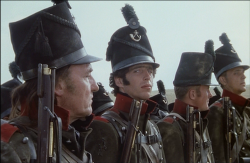60th Rifles
The 60th is a multi-battalion regiment of the British Army. The Fifth Battalion served in Spain during the Peninsular War of 1808-1814, and was commonly known as the 60th Rifles in that theatre of operations.
History
The 60th (Royal American) Regiment was first raised in 1755. Added to the regiment in 1797 by combining two German regiments, the 5/60th (5th Battalion of the 60th Regiment) are three years older than the 95th. They have a very high ratio of Germans and German-speaking soldiers, although they do have a handful of British men. Their motto is Celer et Audax (Swift and Bold) and they do their best to live up to it, taking only the most intelligent and quick-witted men. By the time of the Peninsular War, the men were armed with Baker rifles, more accurate though slower to load than muskets, and were trained as skirmishers.
It was due to the high proportion of Germans in the battalion that officers were often requested to read important battalion orders in German rather than English, to make certain of their being understood.
Officers' Training
Unlike the (practically non-existent) training of officers joining Lline or Guards regiments, officers joining the Rifle battalions were expected to learn the same drill as the men they were to lead. This meant joining the battalion at its depot (the 5/60th trained at Cowes on the Isle of Wight), where they drilled with the men - in the same ranks as them - although they lived and ate in the Officers' Mess. Rifle officers were also expect to learn to fire and clean a rifle.
This was done so that they had a better understanding of their men and the unique challenges faced by those whose primary task was to fight in the skirmish line. It also meant that the men had a respect for their officers that was not simply due to the commission they held or their position in society.
